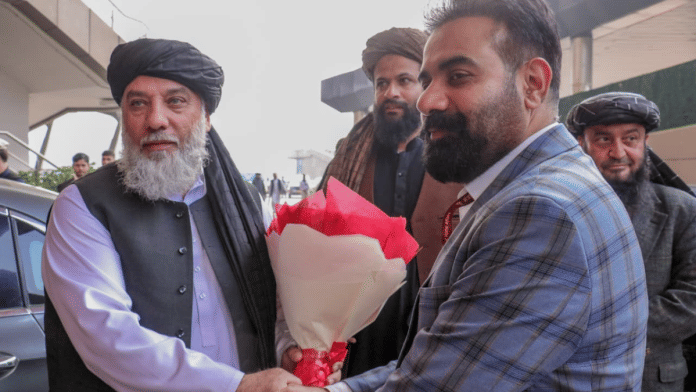New Delhi: Alhaj Nooruddin Azizi, the Taliban’s Minister of Industry and Commerce, arrived in India Wednesday for a five-day visit, with a business delegation, against the backdrop of escalating tensions between the regime in Kabul and Pakistan that has disrupted Afghanistan’s exports.
Azizi is expected to meet External Affairs Minister S. Jaishankar. He is the second senior Taliban official to visit India in a little over a month, after Mawlawi Amir Khan Muttaqi, the Taliban’s foreign minister, travelled to India for a five-day trip and interacted with several Indian officials, including Jaishankar, in October.
The Taliban’s Minister of Industry and Commerce led a high-level delegation to the India International Trade Fair (IITF) Wednesday. Azizi was received by Neeraj Kharwal, Managing Director of the India Trade Promotion Organisation (ITPO). Kharwal briefed him on the ongoing fair and opportunities for Afghanistan to participate in future exhibitions.
India and the Taliban have moved in recent months to deepen their engagement. India upgraded its technical mission in Kabul to an embassy following Muttaqi’s visit. At the same time, the Taliban’s ties with Pakistan have soured. During Muttaqi’s visit to New Delhi, Pakistan launched air strikes on Kabul, with both countries moving to a war footing for close to a week.
Rising tensions between the Taliban and Pakistan saw Islamabad close the border trading posts on 11 October. Border trade has remained shut since. Officials in Kabul have urged their traders to seek other markets for their exports.
Last week, Deputy Prime Minister for Economic Affairs Mulla Abdul Ghani Baradar ordered all Afghan traders to settle their contracts within the next 90 days, according to media reports—indicating Kabul’s potential willingness to sever trade ties with Islamabad.
It is in the midst of this standoff that Azizi has led a delegation to New Delhi. The Taliban minister met Afghan traders in India to discuss market access and the potential for expanding trade ties.
This is the first visit by an Afghan Minister to the ITPO since 2021. India last month also received a sanctions’ waiver from the US to continue operating Chahbahar Port in Iran, which allows its traders access to Afghanistan bypassing the traditional land route via Pakistan.
Key Indian exports to Afghanistan currently include pharmaceuticals, textiles, machinery, and food items such as sugar, tea, and rice. For New Delhi, Afghanistan could provide a valuable source of agricultural products and minerals.
The Taliban regime has also been seeking investments in its mining sector and hydroelectric projects. India has shown interest in accessing the Afghan mining sector. Chinese firms last year signed contracts granting them access to mines in Afghanistan.
India has long supported Afghanistan with development aid to build hydroelectric projects such as the Salma Dam in Herat. However, its projects were halted after the Taliban’s return to power in 2021. Last month, following the meeting between Jaishankar and Muttaqi, the two sides released a joint statement underscoring the need for hydroelectric projects in Afghanistan.
The statement said: “Appreciating India’s assistance in construction and maintenance of India-Afghanistan Friendship Dam (Salma Dam) in Herat, both sides also underscored the importance of sustainable water management and agreed to cooperate on hydroelectric projects with a view to addressing Afghanistan’s energy needs and support its agricultural development.”
(Edited by Shashank Kishan)
Also Read: Taliban’s welcome is justified by pragmatism. It’s also full of moral fault lines







We should invest in their mining sector